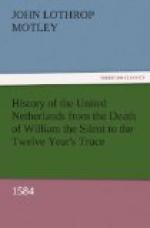The scarce-concealed instigator of these assaults upon the royal and upon the Huguenot faction was, of course, the Duke of Guise,—the man whose most signal achievement had been the Massacre of St. Bartholomew—all the preliminary details of that transaction having been arranged by his skill. So long as Charles IX. was living, the Balafre had created the confusion which was his element, by entertaining and fomenting the perpetual intrigues of Anjou and Alencon against their brother; while the altercations between them and the Queen Mother and the furious madman who then sat upon the throne, had been the cause of sufficient disorder and calamity for France. On the death of Charles IX. Guise had sought the intimacy of Henry of Navarre, that by his means he might frustrate the hopes of Alencon for the succession. During the early period of the Bearnese’s residence at the French court the two had been inseparable, living together, going to the same festivals, tournaments, and masquerades, and even sleeping in the same bed. “My master,” was ever Guise’s address to Henry; “my gossip,” the young King of Navarre’s reply. But the crafty Bearnese had made use of the intimacy only to read the secrets of the Balafre’s heart; and on Navarre’s flight from the court, and his return to Huguenotism, Guise knew that he had been played upon by a subtler spirit than his own. The simulated affection was now changed into undisguised hatred. Moreover, by the death of Alencon, Navarre now stood next the throne, and Guise’s plots became still more extensive and more open as his own ambition to usurp the crown on the death of the childless Henry III. became more fervid.




